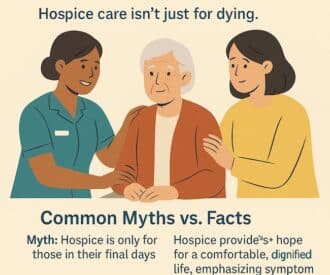
The right hospice provider can make a big difference
Hospice care is a wonderful service for older adults who could benefit from a focus on managing pain and symptoms for improved quality of life.
But the biggest myth about hospice care is that it’s only for people who are expected to pass away within days or weeks – which isn’t true.
In fact, hospice offers a number of services that help both seniors and caregivers.
For example, visiting nurses eliminate the need to go to the doctor’s office and families can get help with personal care tasks like bathing. It also includes emotional and spiritual support for both seniors and families, and 24/7 on-call help.
However, not all hospice companies are equal. Some will provide wonderful care and others can result in negative experiences.
To find the best one to care for your older adult, we share important questions to ask when choosing a hospice provider.
This list of questions cover the basics, additional costs, Medicare coverage, services for patients, and services for the family.
7 questions for finding a good hospice provider
1. Are they recommended by family, friends, or health professionals you know?
Getting a referral to a hospice provider is the best way to find a great company. Ask people you know as well as doctors, nurses, and other health or aging professionals that you trust.
Geriatric care managers may also be a good source of referrals. They often refer clients to hospice providers and are likely to get feedback about the care and customer service.
2. Note your general impressions when you first meet them
Take notes when you speak with different hospice providers.
Write down the impressions you get when you call to ask questions or make an appointment for a consultation.
And when you meet in person, take notes on their customer service, ability to answer your questions, and professionalism.
3. Do they have Medicare approval?
Most hospices are certified by Medicare, but it’s best to make sure before signing any contracts.
The hospice company must be approved by Medicare before any fees and services will be covered.
Coverage should include necessary equipment, home health aides, and counseling and grief support for the patient and family.
4. How long have they been in business in that location?
Hospice providers that have been established longer in your area are more experienced and should have a smooth business operation.
There should also be more feedback and references available.
5. Are there services, medications, or equipment that the hospice doesn't provide?
There can be variations in what treatments or supplies hospice companies provide or cover.
Ask about all your older adult’s necessary equipment, supplies, medications, and treatments to make sure they’ll be covered and supplied by hospice.
6. What out-of-pocket expenses should the family expect?
Make sure anything that isn’t covered and will require out-of-pocket payment is made clear up front.
7. How do they measure and track the quality of their service?
You’re not really asking this question to get a lot of detail. You just want their answer to show that they take their performance seriously and work hard to improve it.
One detail to ask about is if members of the care team have additional training and certifications for their hospice and palliative care skills. That’s helpful to know.
10 questions about hospice services for seniors
1. Are hospice-certified nurses and doctors on staff and available 24 hours a day, including weekends and holidays?
If you call with an urgent need, how fast could they respond? Are qualified staff available to answer the phone 24/7?
For example, if there’s an issue and you need a certified nurse to come to the house at 3am on Sunday, how long would it take for them to arrive?
2. Can they meet your older adult’s specific needs?
If your older adult has special or specific needs, ask the hospice provider how they would handle those.
3. How quickly will a care plan be developed by the hospice?
The care plan will make sure your older adult’s needs and care are documented. This makes expectations clear and keeps everyone on the same page.
Ask when you can expect their care plan to be completed.
4. How quickly will pain and symptoms be managed?
Once hospice takes over, how quickly will your older adult get the medications and treatments they need to stay as comfortable as possible?
When the hospice orders medication, is it delivered by the hospice or do you need to pick it up? Will there be any delays in treatment as the transition is made?
5. If medications aren’t managing pain or symptoms well enough, how long will it take to make changes?
At any time, if the medications aren’t managing the pain or symptoms, how quickly can changes be made? How long will it take to make your older adult comfortable again?
6. What current treatments or medications would have to be stopped, if any?
Is there anything currently being done for your older adult that the hospice provider would not do? Are there medications or treatments that they would discontinue?
7. How often will a hospice team member visit and how long will a typical visit last?
Hospice doesn’t have people constantly at your older adult’s bedside.
Find out how who will visit (nurse, aide, etc.), how frequently (twice a week, etc.), and for how long (15 min, 1 hour, etc).
8. Do they offer extra services beyond the ones that are required?
Some services might fall into a gray area. They’re not required by Medicare, but could improve your older adult’s comfort and quality of life.
For example, radiation and/or chemotherapy for a cancer patient could reduce the size of a tumor and reduce pain. The goal wouldn’t be to cure the cancer, but to provide symptom relief.
9. How are patient and family concerns handled?
If there’s a problem, what’s the process for sharing concerns with the appropriate hospice staff? If the issue isn’t resolved, is there an escalation process?
10. Is there an in-patient unit where patients can go if symptoms can’t be managed at home?
Many hospice providers have their own hospice facilities or have arrangements with hospice houses, hospitals, or in-patient centers.
This might be needed if symptoms become too complicated for home care or to give the family a break (respite care).
Find out if this in-patient care is covered by Medicare (it may not be) or if families will be responsible for payment.
If your older adult is likely to need in-patient care, visit their facility to make sure you’re comfortable with the level and quality of care as well as the location.
5 questions about hospice services for family members
1. What kind of respite care is available and under what circumstances?
If the family is exhausted and needs a break from caregiving, is respite care available?
Ask if there are requirements that need to be met first, what type of care is offered, and who provides the care.
For example, some hospices will move your older adult to an in-patient facility for up to 5 days or provide continuous nursing care at home for short periods of time.
2. What is the expectation about the family’s role in caregiving?
Clarify what the hospice company expects family members to do versus what they will do to care for the older adult.
Make sure the responsibilities the family is expected to take on is realistic for your situation.
3. Will the hospice company provide training to family caregivers?
Family members may not have caregiving skills or experience. But if the hospice company provides training, people might feel more confident and be more willing to help.
4. What help do hospice volunteers provide and how can we request their help?
Hospice volunteers may be available to help with a wide variety of tasks. Find out more to see if they could help you.
5. What kind of grief counseling or support is offered?
Grief counseling services are often available at any time for seniors and families while hospice services are being provided.
Recommended for you:
- Hospice Care Isn’t a Death Sentence: Get the Facts
- 9 Top Questions About Palliative Care vs. Hospice Care
- Which End-of-Life Form Is Needed? POLST vs DNR
By DailyCaring Editorial Team
[optin-monster slug=”yxbytm35zhsdfopnw7qk”][optin-monster slug=”jvhyplxmb4umsjazxecn”]
About the Author

Connie Chow
Connie was a hands-on caregiver for her grandmother for 20 years. (Grandma made it to 101 years old!) She knows how challenging, overwhelming, and all-consuming caring for an older adult can be. She also knows how important support is — especially in the form of practical solutions, valuable resources, and self-care tips.




